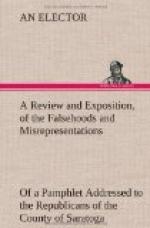Ireland has failed to win her freedom, not so much because she has failed to shed her blood, but because her situation in the world is just that unique situation I have sought to depict. Belonging to Europe, she has not been of Europe; and England with a persistency that would be admirable were it not so criminal in intention and effect, has bent all her efforts, all her vigour, an unswerving policy, and a pitiless sword to extend the limits of exclusion. To approach Ireland at all since the first English Sovereign laid hands upon it was “quite immoral.” When Frederick of Hohenstaufen (so long ago as that!) sent his secretary (an Irishman) to Ireland we read that Henry III of England declared “it hurt him terribly,” and ordered all the goings out and comings in of the returned Irish-German statesman to be closely watched.
The dire offence of Hugh O’Neill to Elizabeth was far less his rebellion than his “practises” with Spain. At every cessation of arms during the Nine Years War he waged with England, she sought to obtain from him an abjuration of “foreign aid,” chiefly “that of the Spaniard.” “Nothing will become the traitor (O’Neill) more than his public confession of any Spanish practices, and his abjuration of any manner of harkening or combining with any foreigners.”
Could O’Neill be brought to publicly repudiate help from abroad it would have, the Queen thought, the effect that “in Spain... the hopes of such attempts might be extinguished.”
As long as the sea was open to Spain there was grave danger. If Spaniard and Irishman came close together O’Neill’s offence was indeed “fit to be made vulgar”—all men would see the strength of combination, the weakness of isolation.
“Send me all the news you receive from Spain for Tyrone doth fill all these parts with strange lies, although some part be true, that there came some munition.” It was because O’Neill was a statesman and knew the imperative need to Ireland of keeping in touch with Europe that for Elizabeth he became “the chief traitor of Ireland—a reprobate from God, reserved for the sword.”
Spain was to Elizabethan Englishmen what Germany is to-day.
“I would venture to say one word here to my Irish fellow countrymen of all political persuasions. If they imagine they can stand politically or economically while Britain falls they are woefully mistaken. The British fleet is their one shield. It if be broken Ireland will go down. They may well throw themselves heartily into the common defence, for no sword can transfix England without the point reaching behind her.” (Sir Arthur Conan Doyle, in the Fortnightly Review, Feb., 1913, “Great Britain and the Next War.”)
The voice is a very old one, and the bogey has done duty for a long time in Ireland. When, to-day, it is from Germany that freedom may be feared, Ireland is warned against the German. When, three hundred years ago the beacon of hope shone on the coast of Spain, it was the Spaniards who were the bad people of history.




